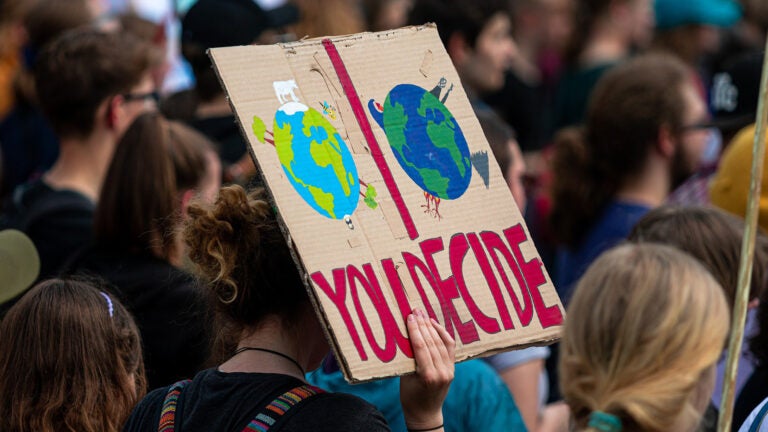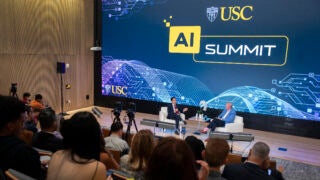
An August report from the Intergovernmental Panel on Climate Change called global warming a dire threat requiring an immediate pivot from fossil fuels. (Photo/Pixabay)
With the clock ticking on climate disaster, USC experts see ways to respond
Scientists and researchers discuss how humanity will respond to climate change as the 26th U.N. Climate Conference and two weeks of negotiations kick off this week.
Global leaders are gathering this week in Glasgow, Scotland, to discuss climate change and likely the shattering assessment by the Intergovernmental Panel on Climate Change (IPCC) in August that flagged global warming as a dire threat requiring an immediate pivot from fossil fuels. The United Nations Climate Change Conference taking place from Oct. 31 to Nov. 12 is widely viewed as the most important opportunity to reach consensus on reducing greenhouse gas emissions since the Paris Climate Conference in 2015.
Experts say humans have fueled climate change at an unprecedented pace and the report warns there’s limited time to avert sea level rise, extreme drought, rampant wildfires and more dangerous storms, among other calamities.
On Nov. 3, USC President Carol L. Folt will participate in a climate-themed webinar with Los Angeles Mayor Eric Garcetti from 7:45-8:15 a.m. Wednesday, Nov. 3.
USC experts discuss how humanity will respond to climate change as the 26th United Nations Climate Conference and two weeks of negotiations kick off this week.
A “code red for humanity”
“The IPCC’s Sixth Assessment Report is its most definite yet, combining all available lines of evidence to reiterate, more unequivocally than ever, that humanity must stop burning carbon as soon as possible,” said Julien Emile-Geay, an associate professor of Earth sciences at the USC Dornsife College of Letters, Arts and Sciences and an expert in climate modeling.
Emile-Geay said that for decades, climate experts have raised the alarm that the consumption of fossil fuels is “fundamentally at odds with the prosperous, peaceful future to which so many of us aspire.” But, he said, the fossil fuel industry has played a role in muddling the message and governments haven’t taken adequate action.
Warnings once issued in the future tense are now decidedly present. Will we listen this time?
Julien Emile-Geay
“Warnings once issued in the future tense are now decidedly present,” Emile-Geay said. “Will we listen this time? We no longer have the luxury of waiting.”
Shannon Gibson, an associate professor (teaching) of international relations and environmental studies at USC Dornsife, agreed.
“The newest IPCC report has aptly been called a ‘code red for humanity.’ It’s a sharp signal to the world that countries must act now to make strong mitigation commitments at the upcoming United Nations climate negotiations,” said Gibson, who is attending the conference virtually along with a team of USC Dornsife undergraduate students during a retreat hosted by the USC Wrigley Institute for Environmental Studies on Santa Catalina Island.
“Sadly, we have wasted decades on negotiations,” she added. “If we are to curb impending climate change, negotiators need to seriously heed the warnings and predictions of this newest report.”
USC climate change experts say communication needs improvement
Climate experts may also need to change how they speak about the crisis, which is frequently described in terms the average person can’t understand, argued Wändi Bruine de Bruin, Provost Professor of Public Policy, Psychology and Behavioral Science at the USC Price School of Public Policy and the USC Dornsife College.
“Words like adaptation, mitigation and carbon neutral make climate change communications harder to understand,” said Bruine de Bruin, who will present findings from a USC Dornsife Public Exchange-U.N. Foundation study at the climate conference, showing how easily people misunderstand terms commonly used to describe climate change. “Even people who are concerned about climate change get confused by the jargon.”
Bruine de Bruin and colleagues have some advice on explaining those terms in everyday language. For example, instead of discussing “mitigation” – which the IPCC defines as “a human intervention to reduce emissions or enhance the sinks of greenhouse gases” – they suggest “stopping climate change from getting worse.”
Climate report confirms we are “locked into a hotter future”
“This most recent report from the IPCC reminded us once again that climate change poses an existential risk to the environment we depend upon and to us no matter where on Earth we live,” said Joe Árvai, director of the USC Wrigley Institute and a USC Dornsife professor of psychology. “We’ve reached the point that we are now locked into a hotter future, one that will be punctuated by deadly heat waves, droughts, wildfire, floods, severe storms, disease, extinctions and the like.”
We’ve reached the point that we are now locked into a hotter future, one that will be punctuated by deadly heat waves, droughts, wildfire, floods, severe storms, disease, extinctions and the like.
Joe Árvai
Árvai will travel to the climate conference as part of a Washington, D.C.-based delegation for the Global Council for Science and the Environment. He said the IPCC report didn’t include guidance about how to upgrade the capabilities of governments and businesses so that they can make better climate risk management decisions.
“We know we have a problem and there are options for solving it, like the kelp-to-biofuel project at the Wrigley Institute,” he said. “Recognizing that we have a problem and having solutions at our fingertips to solve it doesn’t automatically lead to smart choices.”
USC climate change experts ask: Can capitalism help mitigate climate change?
“We will be better able to mitigate climate change if more of the emerging middle class around the world achieves its material desires but also embraces the environmental agenda,” said Matthew Kahn, Provost Professor of Economics at the USC Dornsife College. “This requires a delicate balancing act.”
Kahn, the author of Adapting to Climate Change, pointed out that people in developing nations like Mexico, Egypt and India desire material goods that Americans take for granted, including cellphones, computers, cars and refrigerators.
A key question is whether the world can somehow incentivize developing countries to use less carbon while attaining those material goods. In other words: “How do we design the rules of the game so people living a fossil fuel-intensive life have a stake in the green economy and don’t view the low-carbon agenda as elitist and making them poor?” said Kahn.
“This may not be a popular position, but capitalism will help us adapt.”
Climate action will also address urban air quality, extreme heat and wildfire risk
Climate scientists point out that we’re already experiencing the impacts of climate change, such as increases in extreme heat and poorer air quality.
“We know that extreme heat events are increasing over time, and we hope that our work can be used to direct resources towards building resilience to warming in the vulnerable communities that might suffer most,” said Kelly Sanders, an associate professor of civil and environmental engineering at the USC Viterbi School of Engineering.
Sanders coauthored a study that found low-income, disadvantaged communities in urban Los Angeles lack the means to cool their homes, posing a growing threat to their health — and their lives — from extreme heat waves due to global warming.
Planting more trees will make a difference for those same communities, which lack an “urban forest” to cool their homes, businesses and recreational spaces.
On hot days it can be up to 50% cooler under a shade tree, according to experts with the USC Urban Trees Initiative. Led by the USC Dornsife Public Exchange, the initiative provides a science-based guide for L.A.’s Green New Deal, which calls for increasing tree canopy in low-income heat zones by 50% by 2028.
When it comes to combatting extreme heat, trees are the most cost-effective way of doing that.
Esther Margulies
“When it comes to combatting extreme heat, trees are the most cost-effective way of doing that,” said Esther Margulies of the USC School of Architecture, an associate professor of practice of landscape architecture and spatial sciences and part of the interdisciplinary urban trees initiative.
Action on climate change will also address the growing threat from wildfires.
“The wildfire history of the past few decades, up and down the Pacific Slope and deep into the interior of the Great Basin and Rocky Mountains, tells a story of catastrophe and rapid change,” said Bill Deverell, a USC Dornsife historian who leads USC’s “The West on Fire” program.
“We can’t know the future, but we can and must use the past as a guide,” Deverell said. “The past tells us that this is a new moment, likely a new normal, and we must continue all efforts to work on innovative ways by which to address change.”



